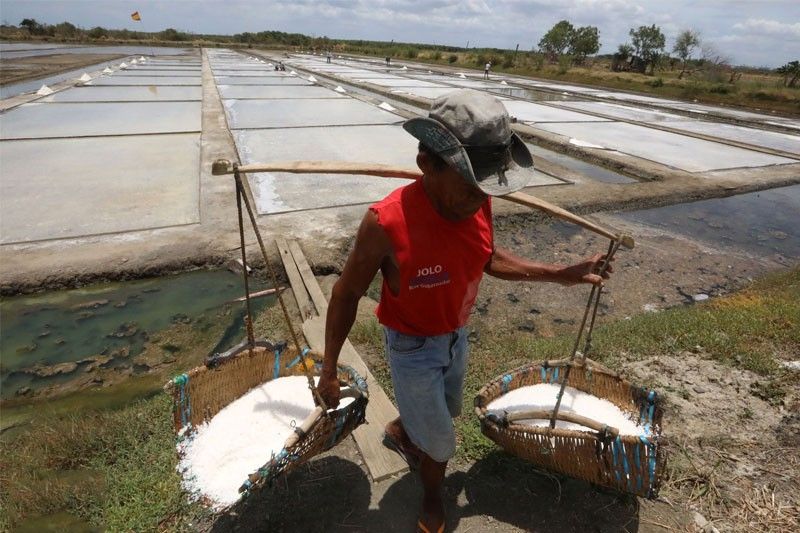DA sets measures to boost local salt production

MANILA, Philippines — The government is supportive of efforts to modernize the country’s salt industry to boost production of the commodity, Malacañang said yesterday.
In a tweet, Press Secretary Trixie Cruz-Angeles said the Department of Agriculture (DA) and other state agencies have initial plans to modernize the salt industry, which she described as “long neglected.”
“The national government is now working double time to beef up support for the salt industry to enhance production of local salt in the country,” she said.
Angeles said the DA would implement programs and initiatives designed to boost salt production and supply. The Bureau of Fisheries and Aquatic Resources (BFAR) will also lead various research and development initiatives on salt production and assist marginal and artisanal salt makers.
The government would also work to realize the Development of the Salt Industry Project (DSIP) for salt makers in Ilocos, Western Visayas and Zamboanga peninsula, the press secretary said.
The DA is also planning to expand salt production areas, push for the development of technologies to accelerate salt production and to work with the environment, science and trade departments to fully develop the local salt industry under Republic Act No. 8172 or the Act for Salt Iodization Nationwide or ASIN.
The country has been importing 93 percent of its salt supply, a situation that the DA had described as an “unfortunate circumstance for a country with 36,000 kilometers of shoreline.”
Salt prices have increased but the trade department has maintained that there is no shortage of the commodity.
The suggested retail price for iodized rock salt is now at P21.75 for 500 grams and P23 for one kilo, while for iodized salt, the SRP is P4.50 for 100 grams, P9 to P12.75 for 250 grams, P16 to P23.25 for 500 grams and P29 for one kilogram.
Assistance
To enhance the local salt industry, the DA, through the BFAR, said it would lead various research and development activities and provide technical assistance to marginal and artisanal salt makers.
Last year, BFAR launched the P100-million DSIP under the Special Budget Request of the Congressional-Introduced Initiative Project.
Covering Regions 1, 6 and 9, the project aims to increase salt production and produce excellent quality salt.
The project was jointly undertaken by the BFAR and National Fisheries Research and Development Institute. The DA said it would also look into the expansion of production areas and development of technologies to accelerate the production of salt.
‘A sin’
“It’s ‘a sin’ to import salt!” Sen. Imee Marcos said yesterday as she expressed dismay over an alleged salt shortage that has led to higher prices of dried fish like and daing and fish paste or bagoong that are part of the ordinary Filipino’s diet.
“Salt is easy to produce, the country is surrounded by salt water, so why do we need to import? We’ve taken salt for granted despite its many uses not only in cooking but also in health and agriculture. Salt is used in manufacturing medicines, food preservatives, animal feed and fertilizer,” Marcos explained.
She said information reaching her office showed that the price of Salinas tuyo has increased from P200 to P280 per kilo in wet markets in Tondo, Manila and Balintawak, Quezon City.
Marcos said it was ironic that the Philippines has the fifth longest coastline in the world but imports salt from China and Australia.
Marcos, a former Ilocos Norte governor, also said that the Ilocos region, particularly Pangasinan and La Union, is among the country’s major salt producers but has not been given ample support by past administrations.
Marcos recommended additional funding for the BFAR to ramp up knowledge transfer, research, training and technical assistance in the use of modern salt production technology.
Inventory
Marcos also called on the government to undertake a comprehensive inventory of local white onions to determine the extent of a shortage caused by last summer’s lean harvest.
“Trace the traders who bought white onions from local farmers and find out if they are hoarding the crop in cold storage. Without a comprehensive inventory, we cannot arrive at a well-calibrated importation policy that answers consumer demand but also relieves our local growers from low farm gate prices,” Marcos said.
“Next year’s national budget should provide more cold storage facilities for our local farmers. For now, an inventory and contract-growing must be done as soon as possible,” she concluded. — Danessa Rivera, Cecille Suerte Felipe, Paolo Romero
- Latest
- Trending




























